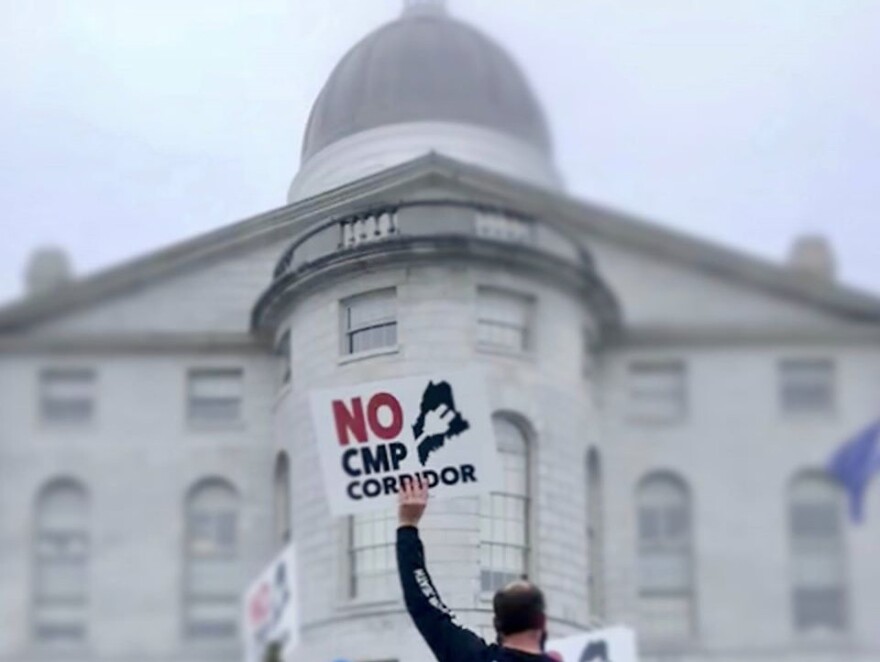The agency overseeing Maine's lobbying regulations wants to update a state law that has allowed some interest groups to influence legislation by spending big without having to disclose it to the public.
The proposal, drafted by the Maine Ethics Commission, deals with what is known as indirect, or grassroots, lobbying. The Commission’s director says it is inspired by an increase in advertising and “influence campaigns” that often don't get reported through traditional lobbying disclosures, and influenced by a shadowy group that is seeking to derail a controversial transmission line proposed by Central Maine Power.

When it comes to influencing state lawmakers' votes on legislation, interest groups and companies have an assortment of tools at their disposal. Some hire lobbyists who attempt to personally persuade legislators to support, oppose or amend bills. And other groups use what Maine law currently calls indirect or grassroots lobbying — using direct mail, print, television or radio ads to shape public opinion on an issue that is before the Legislature.
The group Stop the Corridor bills itself as a coalition of concerned citizens and organizations opposing Central Maine Power's 145-mile transmission project, but it has repeatedly refused to disclose its donors.
Ads for and against the project have been running for more than a year as part of a broad campaign that is now shifting toward a potential referendum on the project this November. But the Stop the Corridor ad ran as lawmakers were considering key bills that could have affected the transmission project.
https://www.youtube.com/watch?v=Yjo9x6ALq2A
Those bills were not mentioned in the ad, but even if they were, there's a good chance the lobbying would not have to be disclosed under current law.
Maine Ethics Commission Director Jonathan Wayne says that is a problem.
"We see more and more grassroots lobbying out there, and yet very little grassroots lobbying gets reported in the regular monthly reports," Wayne says.
Wayne told the Legislature's Veterans and Legal Affairs Committee Wednesday that his agency's bill is designed to modernize grassroots lobbying requirements.
Under current law, disclosure of grassroots lobbying is required only when a group spends at least $15,000 a month on television, radio or direct mail advertising — a high threshold that, Wayne says, doesn’t even include digital advertising and email campaigns. The law also says that interest groups must hire a traditional lobbyist before they are required to disclose grassroots activity to the Ethics Commission.
The Maine State Chamber of Commerce employs several traditional lobbyists, and that is why we know that the chamber last year spent more than $181,000 on grassroots lobbying while attempting to defeat an internet privacy bill that eventually became law.
Other groups engaging in similar activity did not have to file reports if they didn't hire traditional lobbyists.
Wayne says that means these groups can directly affect lawmakers' decisions on legislation with advertising, email campaigns or phone banking without having to tell the public they're doing it, or how much they spent in the process.
"It's not hard to imagine that sometimes groups will be engaging in this kind of grassroots lobbying, and they won't already have lobbyists like this other group did," Wayne says.
The Ethics Commission proposal would lower the spending threshold that would trigger a public lobbying report — from $15,000 to $2,000 in a month. It also adds grassroots lobbying activities that are currently exempt — such as digital advertising and contacting legislators by phone or email — as long as the spending on those activities meets the proposed $2,000 threshold.
Lawmakers on the Veterans and Legal Affairs Committee seemed generally receptive to the proposal during the public hearing, but some, like Winthrop Democrat Craig Hickman, wondered if grassroots lobbying should be treated like campaign finance reporting.
"I mean, any campaign expenditure that we have has to be reported, no matter how much it is. If it's five cents, it must be reported. Why shouldn't that be the case for a grassroots lobbying report?" Hickman asked Wayne.
Wayne says a zero-dollar threshold could anger smaller organizations who rely on volunteer support. That's exactly what happened last year when New York Gov. Andrew Cuomo slashed that state's grassroots lobbying trigger from $5,000 to $500.
And Wayne also raised First Amendment concerns, an argument that didn't appear to persuade Paris Republican Rep. John Andrews.
"I don't think reporting what you do impacts your free speech at all. You just do the paperwork and you can say whatever you want," Andrews says.
Lawmakers on the Veterans And Legal Affairs Committee will attempt to iron out those details in an upcoming work session before sending the bill to the full Legislature.
Originally published 4:25 p.m. Jan. 10, 2020



